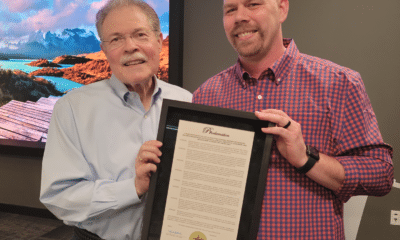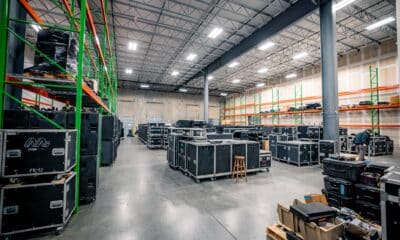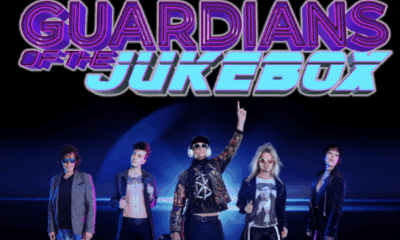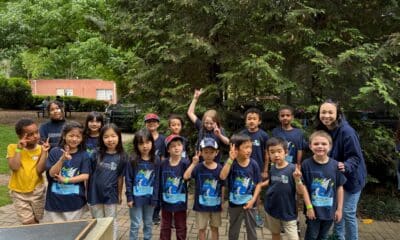Business
How The Atlanta Jewish Film Festival Comes to Life Virtually & In-Person
Published
4 years agoon
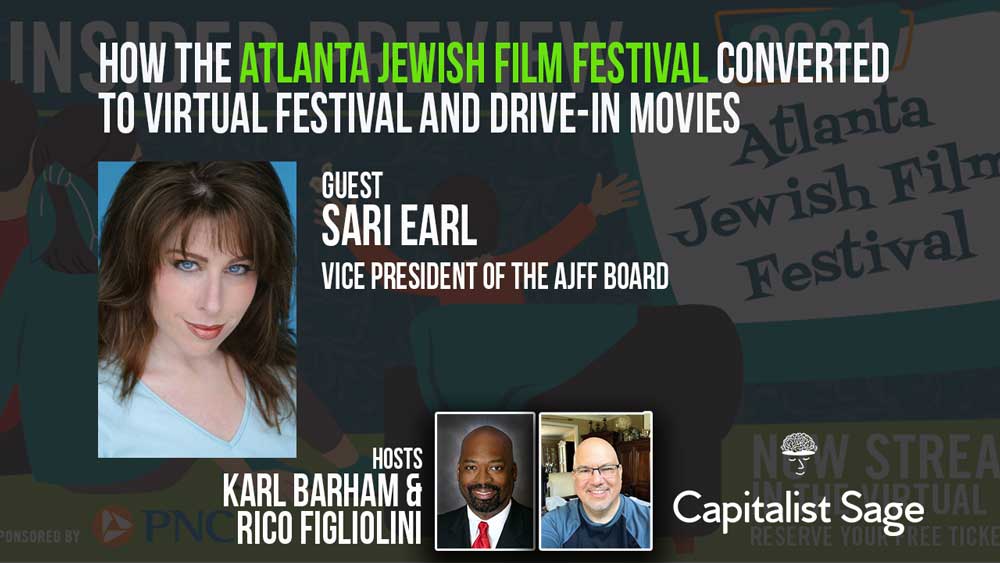
Learning to run a virtual film festival with drive-in movies too, for the first time isn’t easy? The Atlanta Jewish Film Festival is back and better than ever! Karl Barham and Rico Figliolini are joined by Sari Earl, the vice president of the Atlanta Jewish Film Festival board. For years the AJFF has been bringing great films to Metro Atlanta and on this episode listen in to explore how they’re doing a film festival in a pandemic and socially distanced environment.
Website:
https://www.ajff.org
New Website: https://ajffrecommends.org
Social Media: @AJFFAtlanta
Timestamp:
[00:00:30] – Intro
[00:03:17] – About Sari
[00:07:10] – Changing Perceptions
[00:13:20] – Going Virtual
[00:18:09] – Ideas to Take into the Future
[00:22:33] – How Films are Selected
[00:24:35] – Cost of Films
[00:26:53] – Getting Involved
[00:27:58] – Film Recommendations
[00:32:11] – Closing
“I have always been drawn to the mission of the film festival, which is the bridge building. Bringing people together, digging into a topic, and then unpacking it together with a guest speaker. To me that’s really exciting, but it’s the first time where I really think, art is more than art. Art is human and it’s a human connection. And it really spoke to me. It was great.”
Sari Earl
Podcast Transcript
Karl: [00:00:30] Welcome to the Capitalist Sage podcast. We’re here to bring you advice and
tips from seasoned pros and experts to help you improve your business. I’m Karl Barham with
Transworld Business Advisors, and my co-host is Rico Figliolini with Mighty Rockets Digital
Marketing, and the publisher of the Peachtree Corners magazine. Hey Rico, how are you
doing?
Rico: [00:00:48] Good, Karl. How are you?
Karl: [00:00:50] I’m doing well. I’m excited. This is one of my favorite times of years, film festival
time. And today we are going to have a great discussion with Sari Earl, the vice president of the
Atlanta Jewish film festival board. And we’re going to talk about some of the exciting things
that’s coming this year to Atlanta and the film festival. So I look forward to having that chat.
Sari: [00:01:15] Thanks for having me, Karl. Thanks Rico. I really appreciate you having me.
You have a great show and I’m glad to be here.
Karl: [00:01:21] Awesome. Why don’t we introduce our sponsor before we get into our
conversation with Sari today?
Rico: [00:01:27] Sure. Our sponsor is Hargray Fiber. They’ve been a sponsor of both Peachtree
Corners magazine, and for the family of podcasts that we do. And this year they are the, they
introduced the Hargray Economic Stimulus Plan. Just like the federal government has one,
Hargray has one. They’re an internet cable company that provides fiber optic, fast internet
connection and business solutions for not only small businesses, but enterprise sized
businesses. So the economic stimulus plan, real simple it’s one year free of business, internet,
and phone service for those that qualify. So check them out there at
Hargray.com/business/economic-stimulus, and find that website, check them out. Look at what
they’re doing. They’re here in Peachtree Corners. They’re all over the Southeast. They’re not
like the cable guy. They’re really committed to the communities that they’re in. So check them
out, Hargray Fiber.
Karl: [00:02:32] There isn’t a business today that should not have great internet speed, making
sure that their fiber optics is working and they’re able to communicate. Whether they’re working
from home or they want to keep that speed up at their place of work. So I’m really grateful to
Hargray Fiber for all they’re doing in the community and helping businesses with this great
stimulus package.
Rico: [00:02:53] Absolutely. So I just also want to say one other thing. We are a sponsor of the
Atlanta Jewish film festival with the Peachtree Corners magazine and the latest issue that came
out. So I just want to let everyone know that, you know. And I’ll tell them how great the website
is when we get to it. But it’s a great film festival. So I’m excited to have Sari on.
Karl: [00:03:17] Well today’s guest, Sari Earl is the vice president of the Atlanta Jewish Film
Festival board. And for years they’ve been bringing great films to the Metro Atlanta and beyond
community. And today we get to talk about this year’s film festival, some of the interesting things
they’re doing. And even get to explore how we’re doing this in this pandemic environment, this
socially distanced environment. Lots of great options for you to get out and see some films. So
we’d like to welcome Sari to the podcast. How are you doing today?
Sari: [00:03:52] I’m great. Thanks for having me.
Karl: [00:03:54] Why don’t you tell us a little bit, start off by telling us a little bit about yourself.
What do you do when you’re not enjoying great films and tell us how you made it to Atlanta?
Sari: [00:04:03] I’m originally from Brooklyn, just like Rico. And moved down here to attend
Emory law school. I stayed and got my master’s in laws and taxation. And then I worked at Delta
as in-house counsel. I worked for another trade association. And ultimately turned to writing.
And I’ve been a professional writer ever since. I’ve published about 10 books, some fiction,
some non-fiction. I love to try new ways of writing. I’ve written a screenplay and I got involved
with the festival a number of years ago. Mostly through the community building. The American
Jewish committee created the film festival originally, and they have a black Jewish dialogue, a
Baptist Jewish coalition. They have just amazing events and programming, but it’s really about
the interconnecting of our communities. And so the film festival was a program that was so
successful at bringing people together. That we kind of outgrew our founder and partner
American Jewish committee, and we became our own non-profit. And once we did that, like the
partnership with American Jewish committee is so strong and it’s a huge balance. Because yes,
we’re a film festival, but we are focused on our community and our wider community. We
conversed over Jewish films, but the topics are wide ranging and a large percentage of our
audience is not Jewish. And we love that. So typically on a typical year, non COVID year, I go to
the film festival with my friends. As an example, I have a friend who’s an atheist, one who’s in
Hindu and one who’s Catholic. I am Jewish. We all go together, we pick certain films and then
afterwards we debrief about how we process them. And it’s that kind of magical experience that
we’ve done year after year. We love it. As soon as the program guide comes out, people start
circling what they want. I get emails from people I’m going to this one, I’m going to that one. But
also the other thing that really gets me excited about it, are the Q and A’s. We bring in these
guests and we get guests that you’re really not going to hear somewhere else. One of my
earliest guests that I remember so clearly was, it was a film about a Mossad agent, an Israeli
spy who went to go work in Egypt to try to uncover nuclear ambitions in Egypt. And he had a
family in Israel and then he had a family for his undercover work. And the film was about what
happened to him. Great story. At the end of the film, we got to talk to his son about the impact of
his father being a Massad spy on his life. It was fascinating, fascinating. So we get really good
conversations going.
Karl: [00:07:10] I think in particular this past year, if there was a time where people needed to
one, be distracted from the day-to-day through film and through art. And at the same time, bring
people together through shared experiences and seeing artists’ stories and visions and seeing
how it’s received. It’s been this year. And I think, you know, I think many people I talk to have
missed films on a mass scale. And especially the independent ones that are story-driven plot
driven, performance driven stories. We all love the Marvel big, fantastic. But those quieter, that’s
where a lot of people learn about other cultures. And I think the work that you’re doing and the
film festival does to bring that together is amazing. So I’m curious, you know, and do you have a
favorite film that you’ve seen over the past few years that brought a different insight to
something that you may not have, the film fundamentally changed the way you perceived a
person or people or culture or something of significance?
Sari: [00:08:28] Absolutely. The first one that pops into my mind is why culture, why art? And I
remember watching, it was a documentary about the Warsaw Ghetto during the Holocaust and
how people were starving in the streets. People were suffering such indignities by the Nazis.
And during that time they chose to put on theater productions. And I’m thinking, this is the worst
of times, you’re in the worst of places. Who’s thinking about putting on a show? And something
clicked. What was happening is they wanted to keep their sense of joy and play and culture.
And so they put on Yiddish theater in the middle of a Holocaust. And for me, I have always been
drawn to the mission of the film festival, which is the bridge building. Bringing people together,
digging into a topic, and then unpacking it together with a guest speaker. To me that’s really
exciting, but it’s the first time where I really think, art is more than art. Art is human and it’s a
human connection. And it really spoke to me. It was great.
Karl: [00:09:46] Absolutely. I remember watching a film some years ago. And I think it was about
Indian culture, this particular one. Have you heard of the ones that follow water? I think earth,
fire. I remember watching them. They’re just great films and they’re based on books, great films.
But it gave you an insight into a culture that you didn’t see every day. But I remember it made
me reach out to people and want to get to know them and their culture and experience more of
that. And I think the film festivals like this that brings those types of elements together is going to
be the way that a lot of young people are going to really get to learn about people that are
different from them, or grew up differently from them which might make them curious to go meet
more people and get to understand more people. Which is a lot of what we could probably use
now after the past year. People got disconnected, socially distanced. And how do we start
bringing them back together.
Rico: [00:10:45] No, it’s interesting. Go ahead.
Sari: [00:10:48] Sorry Rico. It is really interesting. I mean, the film festival has a lot of films that
are international. We have films from Israel, you know, I have the list here, but it’s a huge list.
We usually have a German films, a lot of German films. Spanish films, Japanese films. So we’ve
had the directors come in. It’s been really exciting, but what I like about it is that I would not
otherwise watch a foreign film, just not my cup of tea. And here through the Atlanta Jewish film
festival, it’s been curated for me then I know it’s good. I know it’s interesting. I know it’s
something where I’m going to learn something about another culture and I love it. So during the
film festival, I’m watching international films. And you’re right, Karl, it makes me feel more
connected and understand these other countries and the people living in them so much better.
And I don’t know that I would do that otherwise.
Rico: [00:11:46] You know what’s more about that too, is that because it’s other countries and
people think Judaism or Jewish people are Israel or the United States. And they’re not
understanding there are Egyptians that are Jewish. There are Brazilians that are Jewish. There
are Japanese that are Jewish. And that culture of Judaism mixed in with the other culture that
they grew up in or country they grew up in, right? Just makes it so much different and it adds so
much to that fabric of what’s going on in their life because they might be Japanese, but they’re
also celebrating Judaism in that country, right?
Sari: [00:12:26] Yeah. That’s an interesting point. There’s a film this year in the film festival,
which I’m really excited about. I’m going to try to see if I can find the page in this beautiful
program guide, that we love. It’s our Bible for the festival. It’s called They Ain’t Ready For Me.
And it is about an African-American rabbinic student who decides to help save the people of
Chicago’s South side. I mean, it looks so exciting. And the fact that’s something else that’s been
really interesting is learning more about the, not everybody’s just one thing. One color, one
culture, one country. We’re all, you know, a mix of everything and to explore all the different
corners of how different people can intersect those different identities is really fun and opens us
up.
Rico: [00:13:20] I noticed that you circled within that directory your movie. I’ve done the same
thing. But then I’ve gone to the website, which by the way, I’ve got to give you props for. That
website is phenomenal. It’s easy, you can register for the movies. You register yourself, you
register for the movies you want to see. You can go back and check the times and stuff. And as
you’re looking at the videos and actually you can look at trailers on the site too, or a description.
It’s rare that you see a website works so well. To be able to keep you informed and in the ease
of use. So it’s intuitive. You don’t see that even on corporate websites, they’d probably spend a
lot of money. So on a nonprofit side, I’m just totally impressed. So I’ve just got to tell you that.
Sari: [00:14:09] Thank you. I have to give kudos to the staff. Kenny Blank is a phenomenal
leader. The staff is amazing. They’ve worked so hard on the ease of use and I was also
impressed, like everything’s new this year. So going virtual, like we’re on Apple TV. We’re on
Roku. You can find us. You can find us on all of our Q and A’s are going to be posted on
YouTube so you don’t even have to buy tickets to the film. And yet you can access those
amazing question and answers where we have these phenomenal people talking about their
films and their journeys. And we’re really trying to make it as accessible as possible. And I’ve
got to tell you, the staff really has out done themselves.
Rico: [00:14:52] And as a former film production manager, when I was in school and I used to
publish a fanzine back in Brooklyn for movies. I went to the Star Wars premiere and sat next to
Rex Reed, who was wondering who these kids were. I was with my siblings reviewing the movie
for the fanzine. Just to be able to see the Q and A part and understand how that movie was
made. Where people think, Oh, that’s easy, or they have a predetermined a way that it was
done or something. And you realize, wow, that was an accident? That happened on set? That
was just improv when it looked like it was organic or something. So the sweet spots of seeing
how a movie is made.
Karl: [00:15:37] Today, they have all those extras on films. If you go on Netflix, you’ll be able to
see the extra director’s cut, directors comments, and so on. Well, you know, 20 years ago they
didn’t have those things. And if you went to a film festival, you get to hear some of those
insights, those questions. You know, was that luck or was that planned and how did they think
through making a film? Which I’m pretty sure that those folks ended up being this generation of
filmmakers. And so for young kids out there right now and their families, if they’ve enjoyed film,
going on that website, and I think doing, circle the films that you want to take a look at and sign
up, get tickets and enjoy with your family. Make it a family experience. And listen to the Q and A,
and then have that discussion with your family about what you interpreted from the film.
Whether it’s the technical, how it was made, or maybe it was the story of the plot, or questions.
That’s a great COVID socially distant activity to do with the family that, you know, in years past,
you may not have been able to do as easily if you had to go out. But I got a couple of kind of…
Sari: [00:16:47] Before we leave this topic, it’s a really good point. The things that are made
easier by going virtual in the past, you had to be in your seat for the seven o’clock showing, and
then wait afterwards for the setup to have the guests. This year, it’s seamless and you have a
window. So the film festival is February 17th to February 28th. And during that time period,
tickets are on sale now AJFF.org. Which is, thank you for complimenting our website, that was
great. But you have a window now, so you don’t have to watch it at a certain time at night. You
might be a morning person. You might want to watch it while you’re working out. You might want
to watch it, you know, with other people, as you were saying, Karl. So there’s a window within
which you can now screen it. And that really opens it up. And then the Q and A’s will be there for
you.
Rico: [00:17:39] And not only that you can watch more than what you may have done before. So
last year before COVID, maybe you got to three of these movies, maybe you did the midnight
show. Which I’m going to watch that midnight horror movie, right? The Vigil. That’s going to be
cool. I’m going to watch that I’ve been dying because that’s the time to watch it. But this time I
can watch a half a dozen or a dozen if I want. I mean, it’s so different than before. It’s probably
opening it up to a wider audience than could otherwise have made the festival.
Karl: [00:18:09] And that was actually where, where I was going to ask, of the things that have
changed because of COVID. What are some of the things that just, you know, maybe might’ve
surprised the team and or blessings that, you know, things that you’d like to figure out and
incorporate and keep around, even beyond this period that everyone’s socially distant.
Sari: [00:18:30] That’s a great question. So when everything first hit, the real conundrum was,
do we hibernate or do we innovate? And we went with innovate. So we spent a lot of time
searching web platforms, figuring out what a virtual film festival would look like. Going to drive
ins, which was really fun. We got to test different drive-ins and for the first time ever, we’re
having drive-ins at the Atlanta Jewish Film Festival. They’re going to be at the Mercedes-Benz
stadium and the Home Depot backyard. And we’re going to have three films. Shivah baby,
Spaceballs, we always bring back some great films that we love, and Little Shop of Horrors. And
we’re having food trucks. We’re having a donut truck. We’re having giveaway bags. I mean,
we’re trying to really bring the festival and the festivity into this experience. So that’s definitely
something different than I really had fun with. But there’s something else that happened that we
realized during COVID. First, we have hundreds of volunteers and they really wanted us to stay
on track. They wanted us to keep our schedule. They wanted to keep working in the film
evaluation and get the films curated for this upcoming festival. And doing all of our meetings on
Zoom, we not only became more accessible to new volunteers who otherwise couldn’t have
gotten into our building. I never want to lose that voice at the table. Someone who maybe had
an accessibility issue or some kind of an issue that made it so that they could not be there in
person. Now they can participate. I never want to lose those voices. Those people who are
fresh to the table and let us see things from a different point of view. We’ve had a number of
new volunteers come on, who otherwise never could have been able to attend and participate.
And I don’t want that to ever go away. It’s been phenomenal. The other thing that we did is we
took our entire collection of every film that we’ve shown at the film festivals in years past. And
we uploaded it onto a platform on the internet. It’s at AJFFRecommends.org, brand new
website. I’m particularly excited for the educational pieces. We have a lot of school partners,
great schools that are exposing their students to, like you said, Karl, these different viewpoints,
different countries, different cultures and then want to unpack it. And so we can recommend
films to them that they can get off the platform and help them unpack and create a way to
connect these students to the story on the screen. And then the final thing, which I’m so excited
about, is we created a filmmaker fund to help filmmakers struggling to help them get their films
to audiences. And we have our first film ever that has benefited from the filmmaker fund. And it’s
premiering, it’s world premiere is that the Atlanta Jewish Film Festival. And it’s about the city of
Atlanta. It’s called The City Too Busy to Hate. It’s a great film and it’s produced by three local
filmmakers who are phenomenal people and the film shows you things you would not have
otherwise seen. I got to see a few snippets of it and it was showing Holocaust survivors being
brought together during COVID, spatially distanced to listen to a concert. You know, the things
people did to really open their hearts and try to find ways for other people to be connected.
Because Atlanta is pretty awesome. The greater Atlanta is a pretty unique place and they, this
film explores different pockets of the community and how they tackled with COVID, but also how
they came together under COVID. Very exciting. And the filmmaker is going to keep going. I
love it.
Karl: [00:22:33] We always talk about innovating. When something external challenge is brought
in the organizations that thrive are the ones that figure out how to innovate. And some of the
best, you know, things that we see today comes out of hardship, where people have to figure
out a way. And I think you might’ve missed, you solved the one other really important challenge
that people have in enjoying film festival. You solved the babysitting challenge. Now today
instead of having to get that babysitter and go out there and see a film you could put the kids to
bed, you could put the kids in front of Disney. You can still enjoy the film in so many different
ways that’s going to be important. You mentioned volunteers, hundreds of volunteers. Why don’t
you give a little insight on the process to get the films selected and featured into the festival
each year.
Sari: [00:23:32] So I think this year we had about 500 films submitted. You can go on our
website if you want to submit a film. And then it goes to the film evaluation committee. And I
have served on the film evaluation committee and I did it one term and I was done. Because
you have to see a lot of really bad films to get to the good ones. And I want my film experience
to be curated. That’s why I like the Atlanta Jewish Film Festival. These hundreds of volunteers
having thousands and thousands of reviews that they post online. And then they discuss them.
They come together and they discuss the films. And are they good enough as far as production
value? Is it a relevant story, is it timely, is it Jewish? That question comes up a lot. And then they
curate those films and they propose a list of films that they recommend for the festival. And then
that’s what we weed through to get you the best of the best. So you don’t have to be digging
through a bunch of different platforms. It’s curated for you.
Karl: [00:24:35] Then I’m curious, the other part is the cost now. So the traditional model where
you buy a ticket and you show up and so on. How would the cost of the film and what are the
options for people to enjoy these films this year?
Sari: [00:24:50] Well, the great thing about the Atlanta Jewish Film Festival this year is that
when you buy a ticket, it’s for whoever’s in your house. So the ticket could be for five people. It
could be for ten people. It’s whoever’s in your pod can get it. You get a code and the code gives
you entrance into the film. The drive-in, you pay per car. And once you pay per car, you can
have as many people in your car as you want. You can show up for that screening. So the
prices are actually pretty good. And then the Q and A’s are free. Anyone can watch a Q and A,
even if they haven’t seen the film.
Rico: [00:25:27] Let me ask you something on the drive in part. If someone comes in with a
pickup truck and lays down the back and puts the all the blankets down, is that a good, is that
good?
Sari: [00:25:38] Don’t make me laugh. You’re making me laugh. That’s good. I think we said any
vehicle, any vehicle.
Karl: [00:25:50] I can see school buses rolling in, people in school buses.
Sari: [00:25:54] Hey there is a donut truck coming with hot cocoa. So a school bus would be
very appropriate. But, yeah, so we tried to make it accessible. And, but we’re also a nonprofit. I
mean, we’re not making a profit off this. We’re providing a service, we’re part of our community.
And that’s the thing that was amazing about this year. People wanted to support us. They said,
we don’t want you to just survive. We want you to thrive. And it’s been really beautiful to see
how many supporters came up and said, you’re important to our experience of living in Atlanta.
You’re important to our experience of being in Atlanta, Jewish and non-Jewish. And it’s been
really exciting. And heartwarming, I guess, is the best word heartwarming to have so many
sponsors and supporters really care about us and volunteers who are willing to give their time. I
mean, we’re a volunteer nonprofit and we have some of the most talented and amazing people
coming to help us. We’re very, very lucky and we really appreciate it.
Karl: [00:26:53] We want to help continue that. So if people are out there watching this and they
want to get involved, whether it’s through sponsorship and donations, whether it’s through
volunteering their time, what are the ways that people could get involved? How do they reach
the organization?
Sari: [00:27:09] Well we are on Instagram, Facebook and Twitter. AJFF Atlanta is our hashtag,
AJFF Atlanta. So Atlanta Jewish films. But more importantly, I would go to the website. We have
one of our best committees is called community engagement. And it brings a cross section of
people, different religions, different races, different identities, different socioeconomic
backgrounds. And we come together to talk movies and how to bring people to films. I love that
committee, highly recommend it. We have a guest programming committee also, that’s really
fun. A lot of celebrities because we pick who gets to introduce films, who gets to do the Q and
A’s. So I would go to our website and check it out. Please volunteer, AJFF.org.
Karl: [00:27:58] That’s fabulous. Well, I mean, we could talk about films forever. Are there any
that you have on your watch list? For folks that are new, you might suggest that they take a look
at? Give me one or two recommendations that I can put on.
Sari: [00:28:14] Okay, alright. So we have some phenomenal guests. If you guys seen the show
Unorthodox on Netflix, the actress who stared in it is brilliant. And we have got her attending our
festival and speaking to us, she’s throwing in a film called Asia. And it’s ASIA, and I’ll see if I can
find it. But it’s a phenomenal film about a woman and her daughter and their relationship which
can be really challenging. The other films I’m really excited about, Howie Mendell is our closing
night. He is coming to our festival via Zoom. We’re interviewing him and he’s great, and funny,
fun, fantastic. Who else is fun? There are so many, I mean, the one I mentioned to you earlier
They Ain’t Ready for Me. Can’t wait to see this, very excited. Okay, the horror movie is called
the Vigil. And the Vigil is having a midnight showing. And then of course we have a window to
watch it afterwards. If midnight is not your cup of tea. And I heard it’s phenomenal. In Judaism,
when someone passes away, there’s a tradition to have someone sit with the body. And the film
takes that experience and creates a horror film out of it. And I heard it was fantastic. We have a
film critic who’s on our film, who chairs our film evaluation committee. He said this film was
fantastic. And Karl, to your point about the children and the babysitter problem, there’s a film I
don’t know if you can see it, it’s called the Crossing. And it’s about children who have to cross
over a wilderness during World War II in Norway, and it’s great. Great films. So there are films
that are child-friendly including the drive-ins. I mean, the drive-ins are a great opportunity to get
out with your kids in a safe space.
Karl: [00:30:16] Oh yeah, Spaceballs is a classic.
Sari: [00:30:19] Spaceballs is a classic. I mean, it’s the best and you know, our kids haven’t
seen these movies. Our kids haven’t seen Little Shop of Horrors and it’s an event and you’re out
and I’ve been to the Home Depot backyard at Mercedes Events theater. It’s phenomenal. It’s a
great space. It’s open, it’s, I felt really safe when I was there. I’m excited for the food trucks.
We’re doing giveaways. We’re making it festive because we want people to enjoy this and have
some fun.
Rico: [00:30:47] I think I would go for the food trucks too, you know? Kosher food, a couple of
knishes. I mean, it’s just like, I’m just missing a few things from New York.
Sari: [00:30:58] Oh yeah. I wish, but there’s no knish, but there are donuts. That’s another thing
that we’ve added for the festival this year. We have home delivery of some gourmet meals, with
your movies. So when you order your tickets, it’ll pop up and say, would you like a meal
delivered to your house? And if you buy opening night tickets, this is an insider tip. If you buy
tickets for opening night, you will get a free festival in a box delivered to your home. And inside
the box are treats, we want to support our restaurant partners who’ve been great to us for so
many years. I mean, we really want to make this fun and festive. So opening night festival in a
box drive in we’re going to have some giveaways and some swag and lots of food and fun. And
we’re really trying to make this an event. And so far, the audience is clamoring for this. We’ve
had an amazing response from our sponsors, amazing response from our audience saying, we
want you to, we want the show to go on. The show must go on. So AJFF this year has
reinvented, re-imagined. But we’ll be here February 17th till 28th, and it’s going to be a lot of fun.
So join us, please.
Karl: [00:32:11] Well I want to thank you so much for sharing about the Atlanta Jewish Film
Festival and all the ways that you bring people together through film and continuing the tradition
and innovating it in a lot of different ways. Sari, you have been excellent and a great
ambassador for the program that’s coming up. And again, why don’t you tell us the dates of the
film festival?
Sari: [00:32:38] Sure. It starts February 17th. Tickets are on sale now at our website, AJFF.org.
We are a nonprofit. And our closing night is February 28th. The opening night film Kiss Me
Kosher has gotten rave reviews, and we picked a comedy. We said, we must start with a
comedy this year. We need to lighten up. And then we end with a comedian, with Howie
Mendell. And he’s coming in as a guest for the Atlanta Jewish film festival. So it’s going to be
great.
Karl: [00:33:11] Fabulous. Well, thank you so much. Sari Earl, vice president of the Atlanta
Jewish film festival board. And you know, this year we need laughs. We need distractions. We
need to get out. And the film festival is giving us all of that this year for folks to be able to enjoy.
And so I definitely want to give two notes that I made for myself. This sounds like the ideal
Valentine’s gift for folks. And the beauty of this is you could send this Valentine across the
country. People could enjoy it anywhere. So just through the realities of being virtual, people
could enjoy this from anywhere in the country, really. So really great idea for a gift. So thank you
so much for sharing everything you have today.
Sari: [00:34:00] Thanks for having me. Some of the films, just so you know, are geo blocked. So
they’re only available in Georgia. A lot of the films are available anywhere in the United States of
America. So you just have to go to the website and check it out. But there are plenty of films.
And like I said, they’ve been curated. Like someone else, hundreds of times have viewed this to
make sure it was good and worth my time. So it’s worth checking out.
Karl: [00:34:24] Fabulous. Well, thank you again. Thank you so much. Well I wanna say thanks.
Thanks everyone, the sponsor, Hargray Fiber for continuing to support the Capitalist Sage and
the other family of podcasts that we have. I’m Karl Barham with Transworld Business Advisors
of Atlanta Peachtree. Our business advisors are available to consult on your business, whether
you’re looking to improve it or grow it, whether you’re looking to exit your business. You can
contact myself or any one of our advisors to help to guide you through that path. Now’s a great
time. The SBA is offering great rates and programs for people acquiring businesses. So if you
want to be your own boss, so you can watch more films at the time that you want give us a call.
And we could help you find the right business that fits what you’re doing. Rico, why don’t you tell
us a little bit about what you’ve got coming up.
Rico: [00:35:18] Sure, we just got our latest issue out of Peachtree Corners magazine. I showed
you guys that before. Faith and sports is the cover story. Lots of stuff in here, a lot of good
stories. The roller hockey Ogden rink, and the association along with stories about, from
education to summer camp, to the new redevelopment authority that the city has started, to
aging well resource guide. So that there’s a bunch of good things in here. You can find all of it
almost online now at LivinginPeachtreeCorners.com. There’s an article in here, a short piece on
the on the film festival as well. And we’re going to be doing more of these types of stories
coming out over the next few weeks. If you want to find out a little bit more beyond what I do at
MightyRockets.com. That’s content, marketing, marketing social media, and creative work,
creative services. Check that out. If you need me, you can find me on LinkedIn, Rico Figliolini. If
you can’t spell that, just go to the website and you’ll see it and you can find me almost
anywhere. So yeah, and from, and it’s amazing that the three of us let’s put us back on here,
three of us are all from Brooklyn or New York.
Karl: [00:36:31] Yeah. Absolutely, Brooklyn spreads out all over the country, right? They seem
like 30 something percent of folks in the United States came through Brooklyn. So here we are
reunited in Georgia.
Rico: [00:36:44] Right. Good to have you on Sari. Oh well, hold on. Can’t hear you for some
reason.
Sari: [00:36:50] Thank you so much for having me. I really appreciate it. I had a lot of fun talking
with you guys. It was great. Really appreciate you hosting us and the Atlanta Jewish Film
Festival. Thank you.
Karl: [00:37:00] Our pleasure. Well everyone, go get your tickets. February 17 through 28, check
out the website. Get those tickets, send them out as gifts and support the local community and
just help bring people together. This is the Capitalist Sage podcast. Again, bringing you great
guests from the community here in all aspects of business, whether it’s for-profit or non-profit.
We do not discriminate. We want to talk to everyone and share what people are doing to help
innovate and bring value to the community. So thank you everybody. And thank you, Sari, for all
you are doing for the community
Rico: [00:37:36] Take care guys.
Related
Business
Music Matters Productions Expands Peachtree Corners Headquarters
Published
4 days agoon
May 21, 2025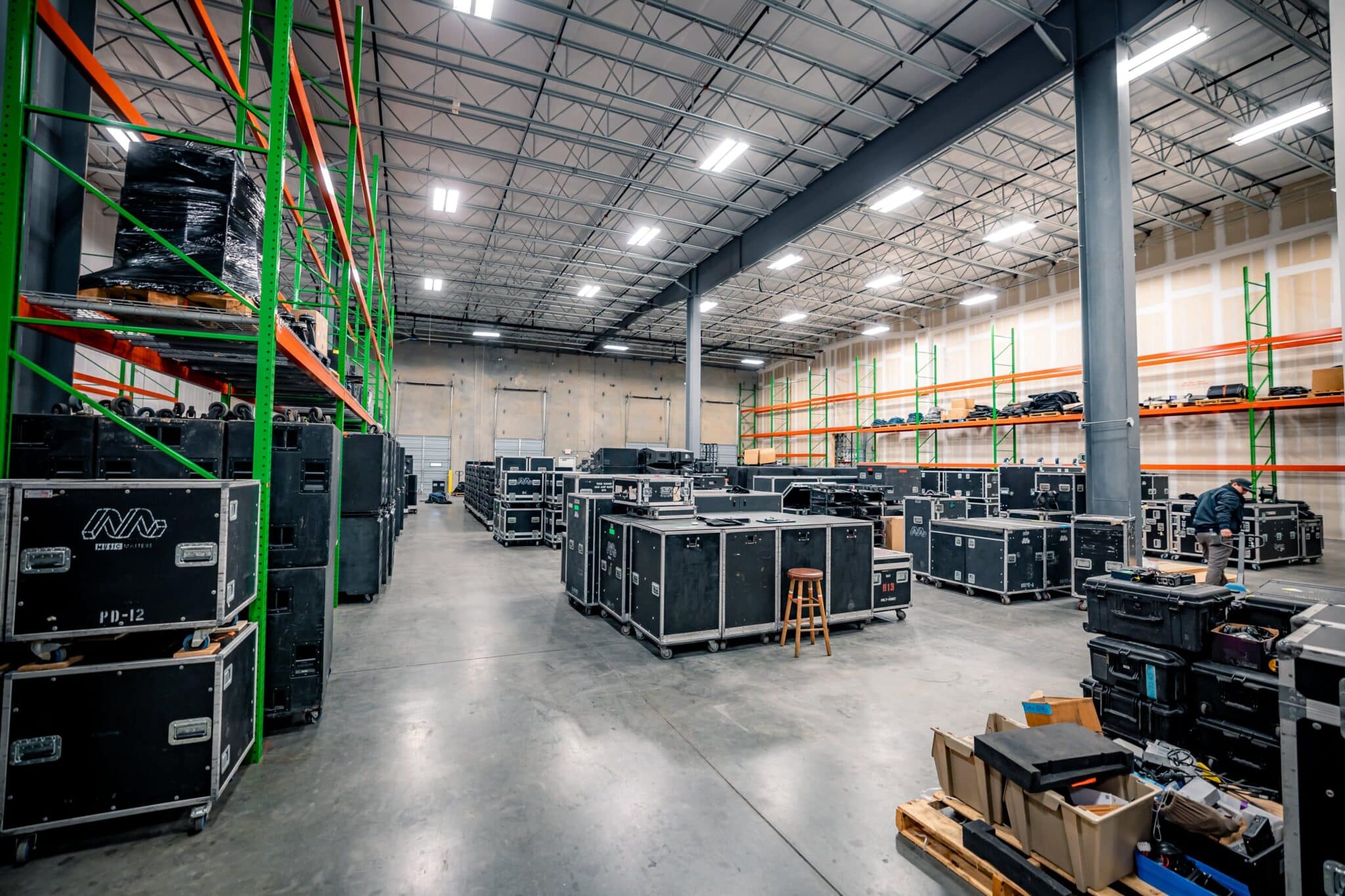
Company adds 20,000 square feet to meet growing demand
Music Matters Productions (MMP), a premier provider of audio, lighting, video, staging and rigging solutions, has expanded its metro Atlanta headquarters, increasing the total warehouse footprint from 40,000 to 60,000 square feet.
In addition, MMP has opened a second 10,000-square-foot building directly across the street to house its growing corporate production division.
The expansion comes in response to increased demand across touring, festival and corporate markets, as well as the continued growth of MMP’s high-end gear inventory. With a fully dedicated shop for each department, including audio, lighting, video, rigging and staging, the new layout provides more space for show prep, pre-rigging and crew coordination, allowing for even more efficient load-ins and streamlined execution.
New features
The rigging department now features a new mobile motor hoist test stand, allowing for in-house motor certification, a service that’s now available to external clients in the production community.
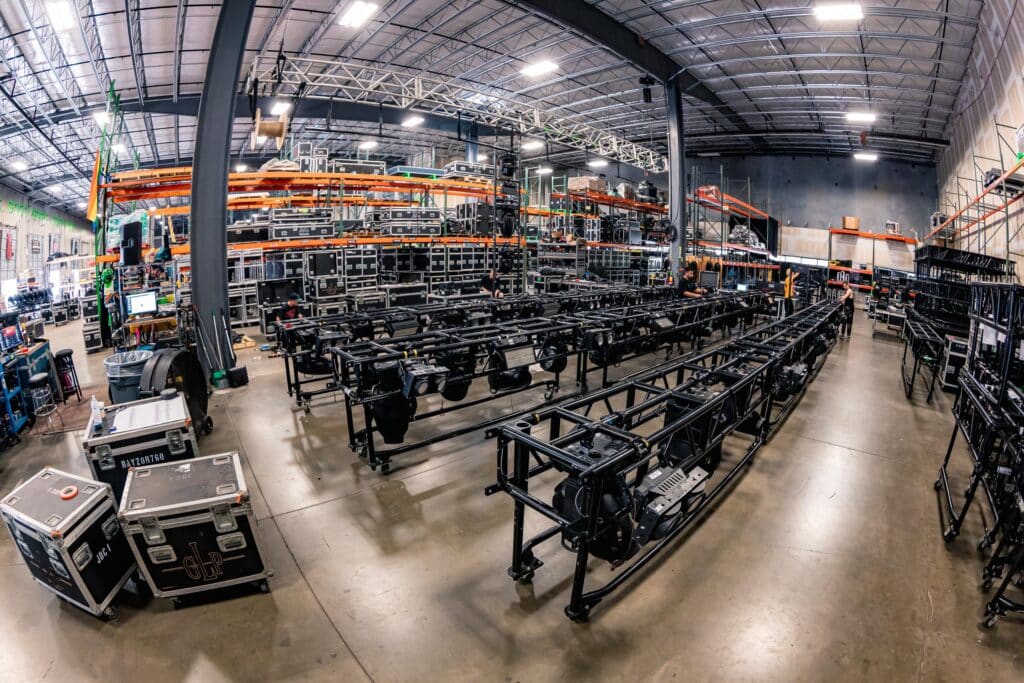
Five new truck bays were added in the process, as well, bringing the total number of bays to 17 — an important upgrade for MMP’s fleet and the increasing number of shows moving through the warehouse each week.
“This growth is a direct reflection of the work our team puts in and the trust our clients place in us,” said Aaron Soriero, owner of Music Matters Productions. “We didn’t expand for the sake of being bigger, we expanded because we needed the space to do the job right. More room means tighter prep, faster turns and better support for our clients.”
Expanding operations
The expanded warehouse and building across the street include additional offices, mixed-use areas and a dedicated repairs department, giving the team more capacity to prep, collaborate, QC and scale for increasingly complex events — both corporate and entertainment.
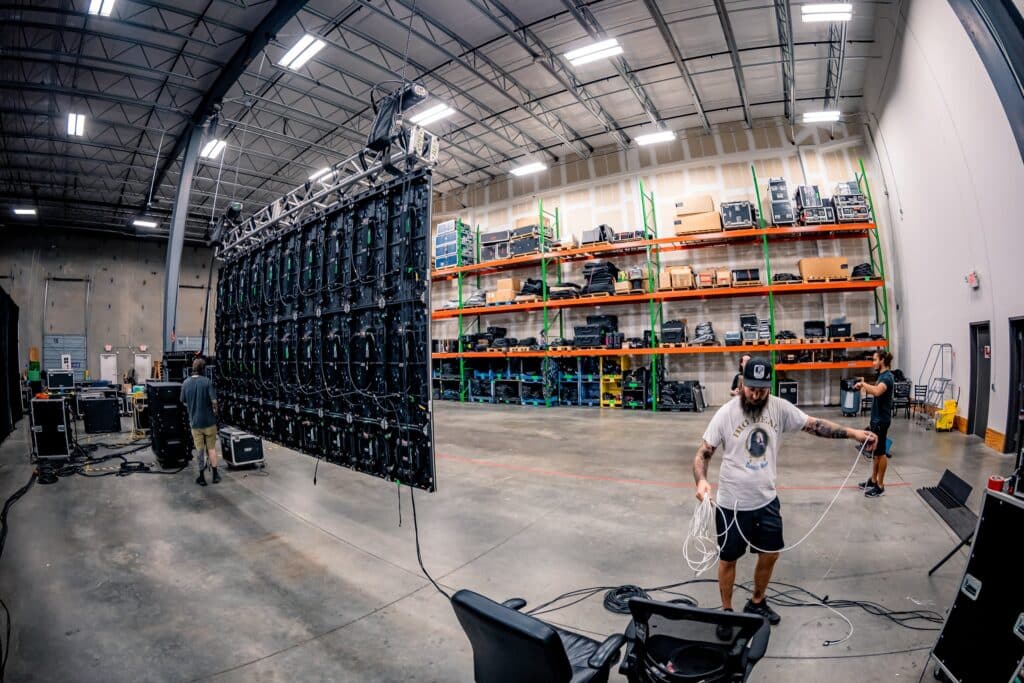
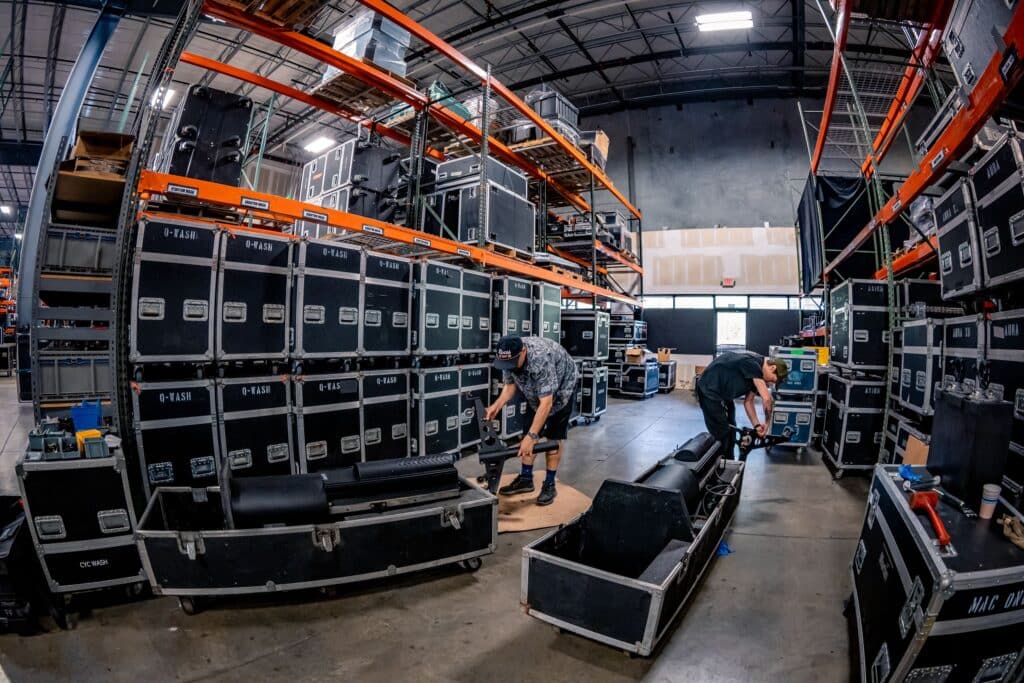
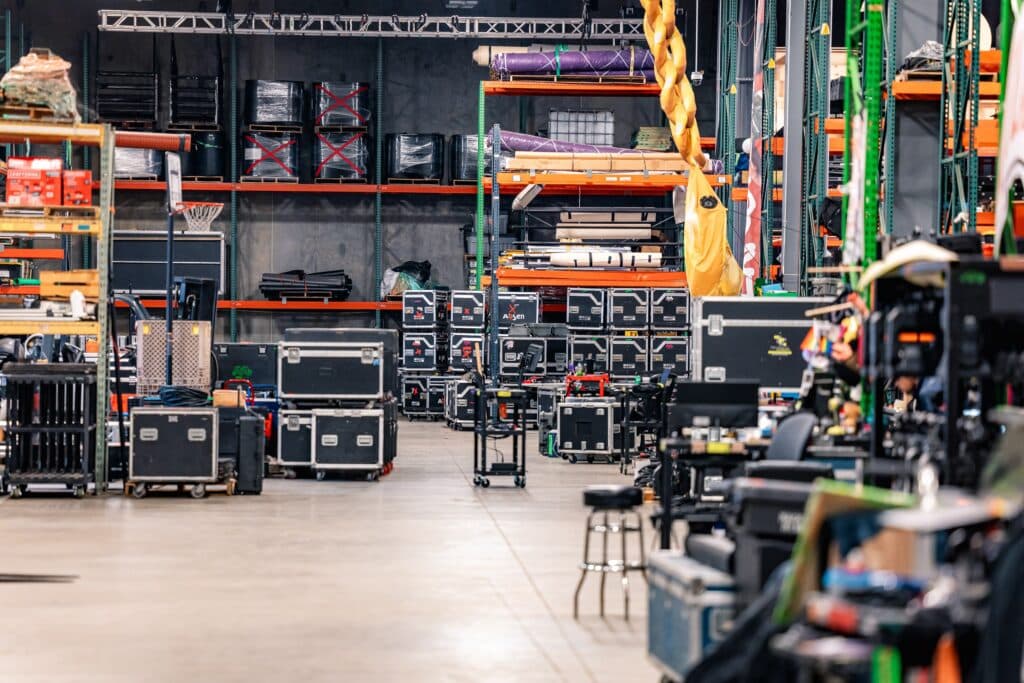
With a reputation built on reliable gear, experienced crews and an enhanced client experience, MMP continues to solidify its role as a go-to production partner for events of every size and setting — whether it’s a beachside festival, a stadium tour, brand activation or a high-stakes corporate show.
About Music Matters Productions
Music Matters Productions is a full-service live event production company based in Peachtree Corners, Georgia, providing industry-leading audio, lighting, video, rigging and staging solutions for tours, festivals, brand activations and corporate events across the country.
Known for its high-end inventory, seasoned crew and deep dedication to doing the job right, MMP supports hundreds of productions each year and is trusted by clients nationwide.
For more information, visit mmp-atl.com.
Related
Business
From Boardrooms to the Himalayas: Vandana’s Journey to Purpose and Growing with Intention [Podcast]
Published
5 days agoon
May 19, 2025
How one family blends operational clarity, conscious leadership, and community-driven values to grow their business — together.
In this episode of UrbanEbb, host Rico Figliolini chats with Vandana Aggarwal, VP of Operations at Aggarwal Real Estate, about the winding road from global consulting to family-run commercial real estate in Norcross, Georgia. With honesty, warmth and insight, V shares how she went from working 80-hour weeks in corporate strategy to rediscovering clarity in the mountains of India — ultimately helping transform her family’s business into a community-driven real estate firm managing over 50 shopping centers.
The conversation weaves together themes of leadership, legacy, operational excellence and the transformative power of both AI and yoga. It’s a story about clarity, courage and conscious growth — both in business and in life. This is another episode you won’t want to miss.
Episode Highlights
- Why Vandana left a high-powered consulting career to join her family business
- How hiking Kilimanjaro and studying yoga in the Himalayas changed her leadership mindset
- The operational overhaul she brought to Aggarwal Real Estate to support growth
- What it’s like working side-by-side with your dad, siblings, and 700+ tenants
- How the company rebranded with intention and built a mission around “building communities as a community”
- Where AI is reshaping real estate—from lease drafting to property management—and where it still can’t compete with people
- Leadership succession planning with siblings at the helm
- The importance of clarity, calm, and conscious growth in both business and life
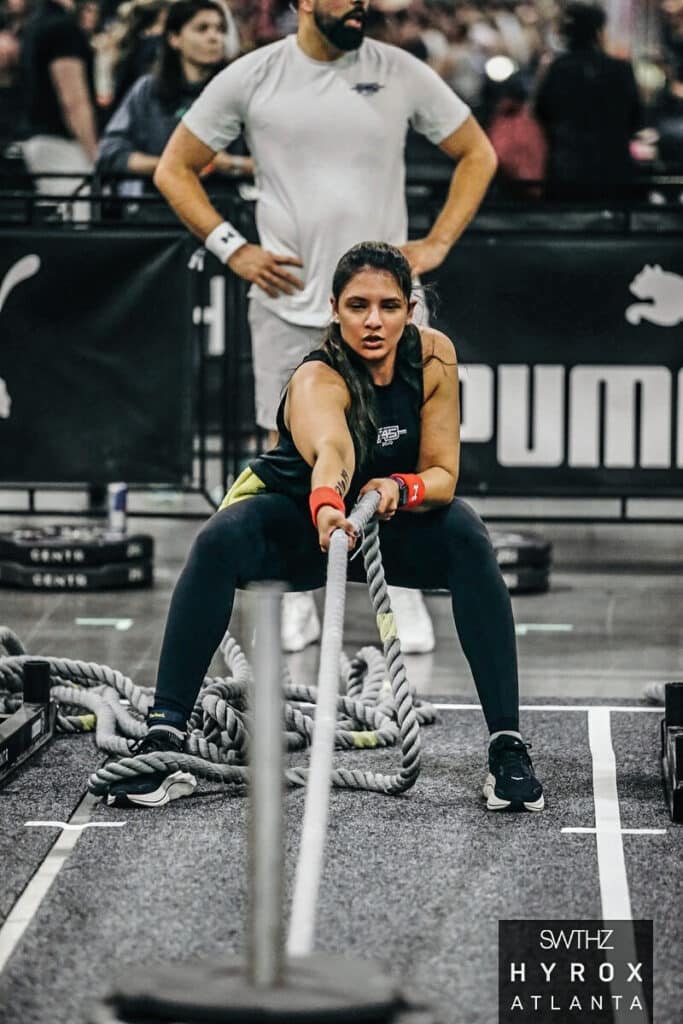


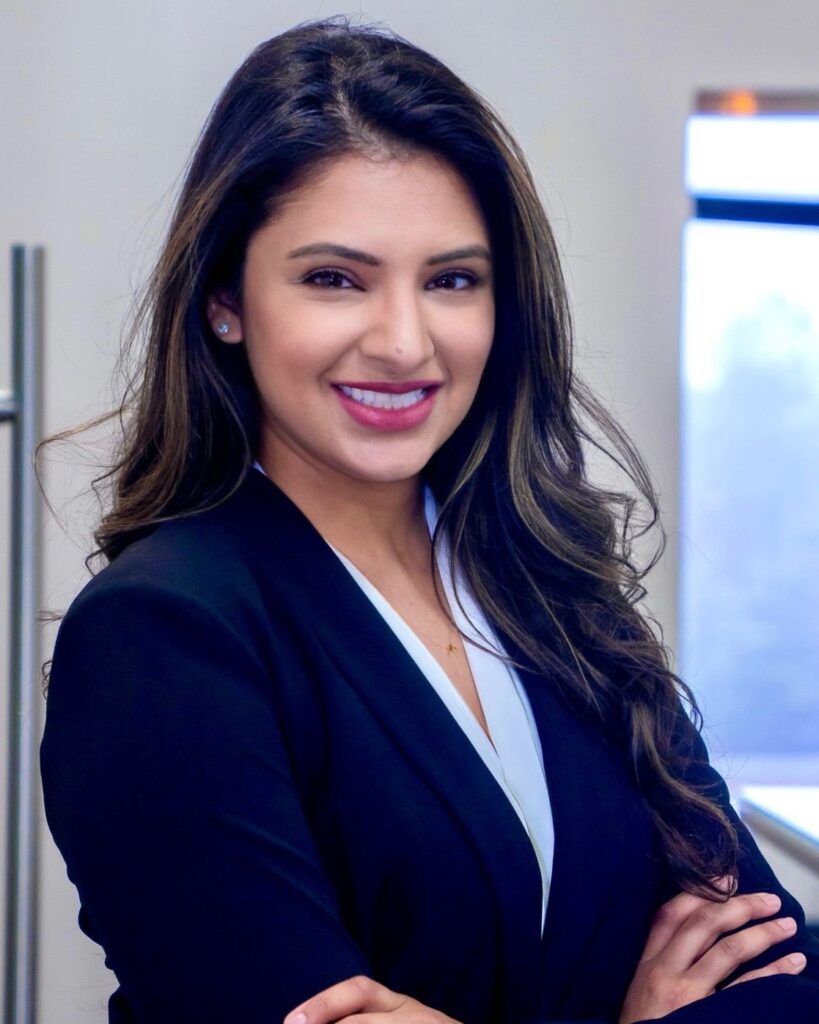




About Vandana Aggarwal
Vandana Aggarwal is the Vice President of Operations at Aggarwal Real Estate, her family’s commercial real estate investment and management firm. She brings a unique blend of strategic insight and operational excellence, shaped by her early career as a consultant at A.T. Kearney, where she advised Fortune 100 to 500 companies. A graduate of Georgia Tech, she also took a transformative detour from the corporate world to spend a year in India teaching yoga—an experience that continues to influence her leadership style today. At the core of her work is a deep commitment to family and a passion for building strong, connected communities.
Timestamp:
00:00:00 – Introduction and sponsors: Vox Pop Uli & EV Remodeling
00:03:12 – From Georgia Tech to global consulting
00:04:23 – Leading strategy for Fortune 500 companies
00:06:11 – The role of vision alignment at the C-suite
00:08:01 – Sabbatical becomes family business overhaul
00:09:35 – Bringing operational excellence to a growing real estate firm
00:12:02 – A year of yoga, nature, and healing in India
00:17:03 – Hiking Kilimanjaro, testing limits, and expanding self-trust
00:18:52 – Navigating family dynamics inside a business
00:21:56 – Planning for leadership transition: siblings, strategy, succession
00:24:06 – Rebranding the business: from American Management to Aggarwal Real Estate
00:26:33 – Where AI fits (and doesn’t) in real estate operations
00:30:04 – Legal, leasing, HR, and marketing efficiency with tech
00:31:01 – Community-focused retail and experiential shopping centers
00:32:00 – Reflections on AI, journalism, and digital trust
00:32:57 – Closing thoughts
Podcast Transcript
00:00:00 – Rico Figliolini
Hi, everyone. This is Rico Figliolini, host of UrbanEbb. This podcast comes out of the city of Peachtree Corners, and we have a special guest today. And if I don’t mess up the name, it’s Vandana Aggarwal.
00:00:15 – Vandana Aggarwal
Absolutely. You can call me V, Rico.
00:00:15 – Rico Figliolini
I’m going to call you V, trust me. And I’m Rico Figliolini, so a bit of a long name there. But V is VP of Operations of Aggarwal Real Estate here, based in Peachtree Corners? No, Norcross.
00:00:30 – Vandana Aggarwal
In Norcross, yeah. Norcross, Georgia.
00:00:32 – Rico Figliolini
Yeah, yeah. Just off 85, and?
00:00:34 – Vandana Aggarwal
Jimmy Carter.
00:00:35 – Rico Figliolini
And Jimmy Carter.
00:00:36 – Vandana Aggarwal
We’re completing each other’s sentences already.
00:00:39 – Rico Figliolini
But where are we doing this? We’re doing this from one of our great sponsors, one of our two great sponsors, Vox Pop Uli. Was this tastefully obnoxious? Let me tell you, I asked them to do a corner cut for us, and this is perfect. So they have the Moxie logo and stuff. So they’re branding, right? Same way they can brand your stuff. They’ll put your logo on anything. They’ve done, I think, 6,000 vehicle wraps. They’ve done garments, obviously. They could do one-offs or they could do 1,000. They do trade show booths, wraps, everything. So anything you need a logo on, think of what object you want it on. They’ll figure it out for you. And if you’re doing, let’s say, 5,000 mailers and you want that database customized for each postcard, they could do that also. It’s called data. I forget what it’s called, but they can do that. They can work the data into the printing as well. So all customizable. Check them out, voxpopuli.com. Now, getting to something we were talking about, hands-on stuff, which is this also. This can’t just be done by machines, right? Although machines, you still need people. But EV Remodeling Inc., they are a remodeling company. They can do design to build. They can do whole house renovation. They can create your deck, your backyard gazebo. They can put a bathroom, kitchen, anything you want. EV Remodeling Inc. is owned by Eli and his family. Lives in Peachtree Corners. It’s based out of our city. They’ve done, I think, over 250 homes recently. So check them out, evremodelinginc.com. And I want to thank both of them for being great sponsors of ours. So, it’s always a long stretch doing that, but I’m glad to have you, V.
00:02:22 – Vandana Aggarwal
I’m happy to be here. Thank you for inviting me onto your podcast. Excited to chat with you.
00:02:25 – Rico Figliolini
Yeah, no, this is cool. Well, you know, I met you, where did I meet you at? I think it was the chamber.
00:02:30 – Vandana Aggarwal
Yeah, the Southwest Gwinnett Chamber event.
00:02:32 – Rico Figliolini
Yeah, and we were talking a bit, and I was like, damn, you know, I had my father owned a business, and he wanted his kids to be in it. None of us, none of us could go into that business. It’s a little difficult, different industry. It was a hard industry, plus my father was very patriarchal, very over-demanding. God bless him. He mellowed in age. But when you were telling me about your family, I mean, your father, your mother, your sister, your brother, and you, I mean, all in it. It’s amazing.
00:02:55 – Vandana Aggarwal
We’re all together. We’re the modern-day Brady Bunch.
00:03:03 – Rico Figliolini
I love it. Yes, that’s exactly it. But, let’s start a little bit. I mean, you were telling me, I mean, you came from a consulting world. You came where you were actually being paid a lot more than you’re being paid right now, actually.
00:03:12 – Vandana Aggarwal
I told my father he couldn’t afford me when he recruited me out. So I graduated from Georgia Tech in 2007. I actually did join his company right out of college for two years, learned a lot about the company. He actually had me go through a rotation in every department of the company to learn more about what we did, how we operated. And I think very quickly, it was also 2008-9 with a recession. But I was also very interested to learn how big companies operate. How can you take a small company at that time? We were much smaller than we are today and really understand how do you go from this, which is where everyone starts, right? As a new company to get to be one of the largest in the nation, in the world and see how they operate, how they grew it from, you know, a mom and pop business to this global enterprise. Consulting was a natural transition to learn about multiple companies, multiple industries. So transitioned into AT Kearney, which has now been rebranded as Kearney, and out of their Chicago office. So I was there for seven to eight years, almost eight years.
00:04:23 – Rico Figliolini
Entry-level position you got in?
00:04:24 – Vandana Aggarwal
Yeah, I went in as an analyst. The good thing with that experience was by the time I left, I was a senior manager with Kearney. I worked across 17 different companies in those eight years. So I got to experience how CPG companies, retail companies, transportation, IT, you name it, I’ve done it. In terms of the different types of industries I got to work with, worked with a lot of Fortune 100 to 500 companies at the C-suite level. So we were coming up with all kinds of strategy projects such as new market entries, mergers and acquisitions. A lot of what I ended up specializing in in those seven years was operational efficiency and growth strategy. So it was an amazing, I’m grateful for that learning experience, the you know the caliber of minds that you work with. You also get to experience what the C-suite looks like. How does the very top operate and then it goes from the top down right? So it is very much led at this very top leadership and you see how companies change in their culture the way they operate based on how the top is designed.
00:05:38 – Rico Figliolini
So did you see good and bad at the top?
00:05:41 – Vandana Aggarwal
Absolutely. And I’m not going to name names. But you learn a lot when you see how your CEO and your C-suite right below them, the culture they’re bringing into a company and their vision and their goals if they’re aligned, unaligned. Anyone that at the very top have different viewpoints of where the company has had it is where companies start to break apart, lose revenue, lose their you know people, which is very important.
00:06:11 – Rico Figliolini
Where did you see the pain point then? What was the common denominator I guess of those?
00:06:18 – Vandana Aggarwal
There’s no one common denominator, but if I had to kind of narrow in, it comes down to what is our five-year, ten-year trajectory? Where are we headed? As large companies grow, you’re not just in one industry. You’re not just doing retail shopping centers. You’re investing in all kinds of properties just to bring it back to our company. Similarly, a CPG company can make all kinds of products, so they have to decide what it is because you have to be concentrated on the right places. If you have a leadership team that is in alignment of what that ultimate goal is, right, then you have clear strategies and, you know, metrics you’re measuring your success against. So that was a big thing that I learned. Also just, you know, seeing how great leaders operate, right? Some of the best in the nation today, I got to be in the room with them and just to see how they lead is very important.
00:07:14 – Rico Figliolini
Did you see any family dynamics in any of those businesses?
00:07:20 – Vandana Aggarwal
No. You know, there may have been like a father-son duo, but when you’re looking at the very top, I won’t say it was like all in the family, right? You know, and it also becomes the size of a company, right? You know, when you get to an international scale, you’re not always blessed that every person in your family has the right skill set and experience to fill each role on that C-suite.
00:07:46 – Rico Figliolini
I’m just thinking Trump for some reason. Every kid has a job.
00:07:51 – Vandana Aggarwal
Every kid has a job.
00:07:52 – Vandana Aggarwal
You had the accent, right?
00:07:54 – Rico Figliolini
Pretty much, I guess. So after the C-suite or expansion, you traveled a lot too, I think, right?
00:08:01 – Vandana Aggarwal
I did, yeah. So after my seven, eight years in consulting, I was reaching 30. And Shiv, my father, came to me and he said, you know, you’re doing this for a lot of outside companies. Why don’t you help us grow and bring your expertise home? And I said, look, I’ll take a sabbatical. Let me assess the company. And after that period where I took a short sabbatical to come look at how we were operating, I said, I can give you three years. I said, you can’t afford me, but I’ll give you three years of my time. And I said, I think it’ll be the right, it was the right time in the company. We were investing very heavily. We were bringing in a lot of new square footage into the company, and we weren’t designed to manage it. So we as a company, as you know, we are the investors. We have an in-house management company, an in-house leasing company. So as we acquire new properties, our team does the management for those properties in-house. We don’t provide third-party services today. And we do the leasing in-house. But at that time, when he, you know Shiv started we had one or two and now we’re at 50 shopping centers plus and other investments that we have. And there’s a very different way you operate you know and how do you how does the CEO go from being an operator to where he’s overseeing it, but he’s not into the weeds right? So he has create a system for that to happen right? You have to have standard operating processes for your property managers, your accounting team, your marketing team.
00:09:35 – Rico Figliolini
And you quite didn’t have that before.
00:09:37 – Vandana Aggarwal
We didn’t, no. And, you know, and I think that’s why he wanted to bring me in is because my strength is operations and I love it. I love going into messy places and cleaning them up.
00:09:49 – Rico Figliolini
Is that what you did when you were a consultant?
00:09:51 – Vandana Aggarwal
A lot of what I was concentrating on at the end of my consulting career, yes. So I did a lot of operational efficiency work. So we’d go in, assess the way companies were designed. And we’d interview hundreds of team members to understand what their role is. You know, what are they responsible for? How are they delivering? What are they measuring for success? And then we’d redesign the way they did that based on, again, bottom line, what are your ultimate goals for the company?
00:10:21 – Rico Figliolini
So you had to understand that before you got to that point. And you’re not making the decisions, the C-level.
00:10:29 – Vandana Aggarwal
Present, right? And similarly even with Shiv, when I first joined, I said, look, this is how I think we need to redesign the company from a bottoms-up perspective based on ultimately our goal of growth, doubling, tripling in size over the next ten years. And I think this is where the father dynamic came in. I guess he trusted me. And he said, do it. He just said, do it. And it was beautiful because right when you’re with large companies, it’s a lot of time before you get. Those decisions made and that trust, right? And so it was great. And he said, yeah, just put it into place.
00:11:07 – Rico Figliolini
See, that’s a great dad, actually. Some dads would be like, I don’t know about that daughter or son or whatever.
00:11:16 – Vandana Aggarwal
It did take time, though, like to ultimately, he was in the operation so heavily. And, you know, until today, I’m still like, step up, step up. Like, I need you to not get into the weeds. Like I think at that time we had tenants calling him, maintenance guys calling him. Like every little and big problem would go through his cell phone. I said, you’re too smart and you’re such a good investor. This is not your skill set. You shouldn’t be managing this. You need to bring people on who are expertise in this area. And I said, you need to be focused on like the larger plan.
00:11:51 – Rico Figliolini
This way you can grow it better.
00:11:51 – Vandana Aggarwal
Which I think has been very successful over the last eight years I’ve been with him now.
00:11:57 – Rico Figliolini
So before you got to him, though, you were traveling a bit internationally as well?
00:12:02 – Vandana Aggarwal
Yeah, yeah. So this is an amazing year. I was very burnt out. By the time I left consulting, I was working 70 to 80-hour weeks, traveling Monday through Thursday, if not more than that, of the week. So I told Shiv, I was like, I’m going to take a month. I’m going to go to India, get my yoga certification. No intention to teach at the time. I just said it’d be a great one-month retreat. And I was up in the mountains like Himalayas and India in a city called Dharamshala. Beautiful place. One of my favorites in the world. And I just, I think I needed it for myself emotionally, mentally to take that break. So I turned one month into one year. I didn’t know it was going to be a year.
00:12:49 – Rico Figliolini
In that same city? In that same town?
00:12:50 – Vandana Aggarwal
Yeah, so I ended up the school that I had gotten my certification with. I asked them, I was like, do you mind if I hang around for a little while? Like very casually, I’m like, you know, I’ll pay for my room and board, but I just want to be around this group and this energy. And they said, well, if you’re going to be here, why don’t you intern? And they’re like, room and board is free if you intern. I was like, sure. You know, not thinking what it was leading to. This is like that beauty of the universe coming into play. Yeah, so I started teaching, ended up loving teaching. So then I ended up teaching the 200-hour yoga training course. And I was in Dharamshala for four months. And then I moved down to Goa, their Goa campus for another six.
00:13:30 – Rico Figliolini
Where is that? Goa?
00:13:32 – Vandana Aggarwal
Goa? It’s in southern India on their west coast. It’s a beach town. Yeah. So I had the mountains and the beach. But I’m a mountain girl. I’m a hiker. But no, it was a beautiful experience. Very different from anything I’ve done with my career, right? But I became a yoga teacher for a year.
00:13:52 – Rico Figliolini
Did that clear your head? Yoga, they say, can do that, right?
00:13:53 – Vandana Aggarwal
Yeah, it’s all the tools of yoga, right? The meditation, the breath work, really getting internal, going in, right? Just going inwards, being quiet, which we don’t have. We have a lot of noise in our life today, you know? And naturally, right? Between family life, work life, social, and then just all of the noise from everything else right? Like we’re sitting here and I can hear the cars right? So you know that difference was when I was sitting there, I could hear the ocean waves and so there’s something very healing in nature naturally. So it was the tools mixed with nature and I still think nature has a very strong healing power on us. So whenever I can, I try to get out on a mountain and by the ocean. But yeah no it was it was a beautiful experience but it did bring a level of calmness into the way I approach things. It changes your perspective of you know at the end everything’s okay. No matter what you’re going through it’s temporary you’re, and everything that’s happening to us is happening to us for the good. We don’t know it, sometimes it seems like a bad situation in the moment, but ultimately you know, universe, God, whatever you believe in is at play to bring you something better in your life. And you just have to step back to understand what is it delivering us.
00:15:19 – Rico Figliolini
I like the way you think. My wife every once in a while would say, aren’t you upset about that? I’m like, I think come tomorrow, it won’t mean anything. There’s no point in, just relax. Not everything, two days later, it’s not as important as it seemed at that moment.
00:15:37 – Vandana Aggarwal
Yeah. And it’s not just that it’s not as important. It’s also like…
00:15:41 – Rico Figliolini
In perspective?
00:15:42 – Vandana Aggarwal
It’s, what am I gaining from this? Like, what can I gain from this? Oftentimes when, you know, a lot of things happen, yeah, like you get hurt or, you know, it’s like in relationships, right? Or if you have a bad business deal, right? It’s like, hey, how am I growing, right? And I think that’s what makes life very exciting, right? Otherwise, if you’re always living on a high, is it a high?
00:16:06 – Rico Figliolini
Yes. So I’m thinking you were a consultant for seven or eight years. 80 hours a week. And all of a sudden you’re doing yoga on the mountains of India. It’s just like, it’s almost like a movie. It’s almost like…
00:16:18 – Vandana Aggarwal
Eat, pray, love?
00:16:19 – Rico Figliolini
Yes.
00:16:20 – Vandana Aggarwal
It was my eat, pray, love moment for a year.
00:16:23 – Rico Figliolini
That’s amazing.
00:16:24 – Vandana Aggarwal
No, you meet amazing people, but I think we were meant to meet everyone that we come in interaction with on a daily basis. You naturally have a connection. There’s a universe at play, and we were meant to cross paths and learn something from each other, gain something from one another, give to the other person. And I think you just have to look at life that way.
00:16:48 – Rico Figliolini
I definitely think along that way. I mean, I definitely think each of us nudges each other in a crowd a little bit. That one nudge can set you off going in a different direction. So I totally believe in that. So you joined your dad. Yes. And you’re, so actually, even before we get there, so yoga, but what other interests have you been?
00:17:03 – Vandana Aggarwal
Yeah. So, I mean, I’m an avid hiker. I’ve done recently in the last few years, I’ve climbed Kilimanjaro. I did the Machu Picchu trail. I’ve done a few 14ers out in Colorado, but I like to test myself physically. You know, just, again, it comes down to how do we find that push within us past our comfort zone? So is this a physical inability or is it a mental constraint? So to get past that mental constraint of discomfort and then really push yourself to the next level and say, I can achieve something. It’s not going to be easy. So to me, if I’m on a hike and it’s not hard, I’m like, well, was it a hike? Like it didn’t test me, but no I think, you know.
00:17:55 – Rico Figliolini
You should do the Appalachian Trail. That’s like 2000 plus miles.
00:18:03 – Vandana Aggarwal
I know. And it is, you know, it’s not just like the hiking part. It is like living out in nature and, you know, sleeping in uncomfortable conditions. Yeah. Walking in the rain. It’s cold. I think the last day of our Kilimanjaro hike, it was negative 20 degrees up in the mountain and my eyelashes were frozen and I couldn’t feel any part of my body. And, you know, and it tested my breathing. And there is that element of push yourself to the point that it’s not your ego anymore. Like if your body’s saying stop, you have to stop as well and respect your body. But yeah, to really test yourself.
00:18:38 – Rico Figliolini
To circle all that back now, you’re back home. You’re working with your father and your family. A lot of businesses grow or die because of family. If it’s a family business, right?
00:18:52 – Vandana Aggarwal
Absolutely, yeah.
00:18:53 – Rico Figliolini
So you have your highs, your lows, your, sometimes you don’t get along. Sometimes decisions are split. People get upset with each other. So you’ve been at your highs and lows physically and mentally doing other things. Has that helped you in some ways? Not that you’re having a bad time with family. Because it sounds like you all fit just fine, like the Brady Bunch.
00:19:15 – Vandana Aggarwal
Let’s keep it that way. No, I mean, there’s multiple dynamics at play. It is a family business. My father is also my boss. My siblings are also my friends and my coworkers. And it’s about no matter how hard you try, you cannot separate those relationships. There is an interplay of all of it when you spend eight to nine hours a day together. But we all have, again, a common goal for the company. And then a common goal for our personal relationship. So when we sit down, we keep in mind that we like each other and we want to keep it that way. Like very simply put, that’s first and foremost for me especially. Even when Shiv had brought me in, he said, oh, can you manage everyone? And I said, I’ll manage everyone but my brother and sister. I said, you know, like I won’t jeopardize the relationship I have with them as a sibling by being their manager. Especially because I said that’s your job like good luck. But not just that it’s you know we all have different skill sets so I said how do I manage my brother who is a genius he’s a CPA by trade you know like I can’t tell him how to run the financials of this company like he’s supposed to teach me that right? And same way I teach him that. My sister has a master’s in marketing right? She is by far the most social, likable person you’re going to meet, and she knows how to work with people. I said, she needs to teach us that. So I think we’re lucky that each of us, and this is, I think, rare, where you have three kids and each one of them has their own skill set. That, I think, helps us stay in business and we see ourselves foreseeably into the long-term future being in business together is because we each bring something very unique to the table. Ultimately we value the relationships that we have on a personal level as a family above all else right? And then you know the element of like, how does the yoga experience a hiking experience teach us. That’s, it’s not specific to anyone’s situation, I think it’s a baseline of who you become right? The foundation. Like it teaches you patience, it teaches you again, everything is temporary so let’s not get overly attached emotionally or get upset or too joyful, even like, let’s just stay neutralized on any situation because it will end. And then the next one will come up and kind of flow with the ebbs and flows of the ocean. You, you flow with everything that comes with you, comes your way at work, at home. But yeah, I mean, we do sit down as a leadership team. I, my father and my siblings and I, and we talk about, hey, we separately do the exercise. Where are we going to be in five years? What role do we play in that journey? And thankfully, all of ours are very similar in what our goals are. And then we have different skill sets that we bring. So even as we design the future of the company in a moment where my father is not at the head of the table, we’re working on that redesign work. But it’s very conscious. It’s very intentional. Again, we all step back and say, hey, look, how do we maintain, how do we solve problems? Because like, you know, we were talking about how tomorrow we may not agree on something, a big decision. What are we investing in? Come back to, you know, right now Shiv gets to make an ultimate decision because he’s the one leader at the top. Tomorrow it’s going to be three people at the top. How do you deal?
00:23:04 – Rico Figliolini
So is there an exit plan for your dad? Well, not an exit plan.
00:23:09 – Vandana Aggarwal
Not an exit plan. He already has. I think he, you know, he’s gone from, he’s the hardest working person I know. I get that from him. We’re addicted to work.
00:23:18 – Rico Figliolini
80 hours a week.
00:23:21 – Vandana Aggarwal
We love working. You know, this company is his baby. I think I’ve adopted it at this point and we all have. But, to stay mentally sharp, to stay alive, you have to keep working. You have to keep doing something. You have to be working towards something that brings you joy and purpose. And I think, you know, he stepped back to take time towards a lot of his nonprofit work, community work that he’s very much engaged with. But he’s still at the top. He’s still running, you know, his, you know, he’s, you know, not slowing down. You know, we’re constantly growing. We’re growing this year in a large scale, which is amazing, and he’s leading that charge.
00:23:59 – Rico Figliolini
How many properties do you own?
00:24:02 – Vandana Aggarwall
Today we have 50 shopping centers and then a few other assets.
00:24:06 – Rico Figliolini
Is that like 3 million square feet or something? 4 million?
00:24:10 – Vandana Aggarwal
Yeah, over 700 tenants. But, you know, when we sat down a few years ago, we rebranded. Aggarwal Real Estate didn’t exist until two years ago. It was American Management Services. And we had a rebranding effort because we said we want the company’s name and the brand to represent who we are.
00:24:33 – Rico Figliolini
I like that, by the way.
00:24:35 – Vandana Aggarwal
Yeah, it needs to mean something. And we were also proud of what our father has achieved, right? He’s given us this beautiful life that we get to help grow upon. So we said it needs to pay homage to him. So we said, let’s make it Aggarwal Real Estate, ARE. And then as we were deciding what that vision is, we’re a family. In the company, we are a family, not just the four of us, but all of our staff, our team. We don’t, you know, we don’t look at them separate from who we are. And so we said our mission as a company is building communities as a community. And it talks about, hey, in all of the real estate work we’re doing, we try to make sure all of our properties are beautiful. Our tenants are happy. They have direct access to each of us in the company. And on top of that, as a company, we are a community within ourselves because we can’t create them until we are one. So it was very intentional to who we already were, but putting it into brand terms.
00:25:37 – Rico Figliolini
It’s amazing. All that property, tenants. Can’t imagine father tech can send text messages on all their problems, if they have any.
00:25:45 – Vandana Aggarwal
He’s a brilliant man.
00:25:45 – Rico Figliolini
You could be too possessed on that stuff. We want to be cognizant of our time together.
00:25:55 – Vandana Aggarwal
Absolutely.
00:25:57 – Rico Figliolini
So the next subject really was going to be about also AI, because everyone’s talking about AI. We were talking about that before the show started, before we started recording, which was kind of funny because V was asking me if we edit anything. And I was like, no, straight through.
00:26:11 – Vandana Aggarwal
I wanted to see if I could say a few things and then have it taken out of this conversation.
00:26:13 – Rico Figliolini
Nope. Nope. Doesn’t work that way. So, but ChatGPT, AI, that’s all. I mean, you know, could I create a bot to edit this? Probably. But there’s so many things we use in our lives. And you’ve been talking about how it would affect your business. Nevermind the consulting work you did.
00:26:33 – Vandana Aggarwal
Yeah. I mean, the consulting world is, I mean, it depends on the industry, the type of work you’re doing. In real estate, I’ve put a lot of thought behind this. There’s a lot of conversations happening across every industry, every sector, whether it’s education, automotives, real estate, et cetera. Everything’s being discussed. How is that changing the future? How do we incorporate it to be more efficient, right? Be the best in the industry that we can be or operate better. And so for me it’s again comes down to that operations element that I think about like, how do I incorporate it for a company that’s a medium-sized real estate firm today as we become a large company, a bigger player in the market. And people are very important in real estate right?
00:27:17 – Rico Figliolini
Talk about editing?
00:27:20 – Vandana Aggarwal
I was telling you, we should bring them into the podcast.
00:27:27 – Rico Figliolini
We’re going to run a little longer on this.
00:27:36 – Vandana Aggarwal
But let’s take retail shopping centers. This is brick and mortar. I did a paper actually for a large mall retailer back in my consulting days on how the title of the paper was, is brick and mortar dead? And, you know, full circle, I am fully dedicated to brick and mortar, retail, office, multifamily now. But you still need people to clean up your properties, fix your maintenance issues. We were talking about roofing, plumbing, electrical. That is hands-on work. You know, today there is, it’s going to be a long time before there’s a robot that comes in to do that. There will be. I don’t know. I do not see that in 10 years to say we’ve got roofers that are robotic drones that are going to come fix my roof problems.
00:28:24 – Rico Figliolini
Zumbas, they’re going to run around the roof or something.
00:28:26 – Vandana Aggarwal
That’s actually genius. A Zumba for my roof.
00:28:31 – Rico Figliolini
Why not? Attach it to the right thing.
00:28:33 – Vandana Aggarwal
But so those are very people-oriented roles today. Technology will advance how quickly it’s done or how well it’s done. But you’ll still need someone to operate the machinery of it and everything.
00:28:49 – Rico Figliolini
Just not as many.
00:28:50 – Vandana Aggarwal
Yeah. Construction, similarly, right?
00:28:54 – Rico Figliolini
Unless you 3D print a house. I’m sorry.
00:28:56 – Vandana Aggarwal
No, it’s true. It’s true. There’s so many options. I’m thinking 10 years now. I’m not going to have a 3D printer making the metal framing for my new construction project. You know, or installing the sheetrock, it does probably speed up the process, right? There will be machinery to help with that, a lot of AI development in that way. It’s a lot at an office administrative level, right? The speed in which you’re processing invoices, the speed in which you are, you know, getting payments taken in. Today, I would say as far back as right before COVID, we were still accepting checks for money. Now it’s all online. Like we do not accept money coming into the office, or it’s very limited to what we do, right? So that’s AI, if you think about it, right? The ability to pay online.
00:29:42 – Rico Figliolini
QuickBooks Online uses AI now, you can enable it.
00:29:47 – Vandana Aggarwal
So we’ve been using it for many years. The advancement of it has been a little bit slower, and now it’s sped up. Marketing, we were just talking about how you created a flyer on ChatGPT, was it?
00:30:00 – Rico Figliolini
I won’t talk about the student that’s helping us out here and how they use AI.
00:30:04 – Vandana Aggarwal
No, AI in school, right? But yeah, it’s an AI processor for my HR roles, right? Instead of reading 100 resumes, it’s going through the system to filter them out. Whether it’s writing contracts, I won’t lie. Legal jargon is coming out of ChatGPT today. And so it’s speeding up the way we’re doing work. But my legal team probably, and they won’t say it, should be using AI if they’re not. To help create some of this work right? So it’s like these companies are still going to be needed, but the way that they’re able to respond to us at a quicker, everything would just happen faster right? From typewriters to computers, everything.
00:30:49 – Rico Figliolini
Especially if they know that they just did a lease from you for this property in Texas, that we need three more leases done for three other places, it’s not going to be that much different, right? It’s a template.
00:31:01 – Vandana Aggarwal
It’s coming out a lot faster. Yeah, I mean the negotiations, that’s a people-to-people thing right? So I think thankfully in the real estate world we’re still going to need people. We’re still going to need buildings right? The way built, we were just talking about how a retail shopping center is no longer just for shopping. It has to be for entertainment. It has to be for bringing families in and giving them more than just, hey, go into a TJ Maxx and buy something, right? It’s like, what else are you getting when you’re at that center? Whether it’s a play space or events, we’re starting to do more events at our shopping centers. So it’s, again, serving the community.
00:31:39 – Rico Figliolini
We’re seeing that more. More of that happening. We could go on and on here.
00:31:46 – Vandana Aggarwal
Chatting with you.
00:31:46 – Rico Figliolini
Yeah, and we should probably do one on either AI in the marketplace. Or maybe a panel discussion on something similar.
00:31:51 – Vandana Aggarwal
Yeah, overall, yeah. That would be exciting.
00:31:55 – Rico Figliolini
Yeah, I think that would be cool.
00:31:56 – Vandana Aggarwal
I think it’s interesting to learn about kind of where every industry is heading. It impacts all of us.
00:32:00 – Rico Figliolini
For sure. I mean, the magazine business, I mean, it’s all like we have certain, we have AI rules. But, you know, AI is still being used to degree to research things. And to do certain things like that. You know, hopefully journalism isn’t just handed over. They do say 40% of the internet is AI written. So, which is kind of incestuous almost because it’ll just feed on itself at some point.
00:32:27 – Vandana Aggarwal
There’s a whole discussion about the validity and the trust behind digital content. In the next few years. I think it’s going to diminish.
00:32:35 – Rico Figliolini
Oh, yeah. I mean, I’m seeing videos now and it’s just like, it just looks so real. And you could not tell the difference, even voice-wise.
00:32:42 – Vandana Aggarwal
And that’s scary to think. It’s like, how do you trust what you see?
00:32:47 – Rico Figliolini
So on that note, and since this is not edited, so this is right from the beginning. So this is all true. But I want to thank everyone. I want to thank you, V, for being with me.
00:32:57 – Vandana Aggarwal
Thank you so much for having me. This was a great conversation.
00:33:01 – Rico Figliolini
It went by way faster than some of these go. So this is a great discussion. Thank you, everyone. I appreciate you for joining us. Thank you for Vox Pop Uli for the studio look and for letting us do it here, for being a sponsor and for EV Remodeling. Also, I want to thank Jeremy Pruitt behind the camera who has taken care. He’s a Paul Duke student. And it wasn’t him that I was talking about before, by the way. But all the work he’s done on the back end on this. So thank you, Jeremy. So thank you all. Thanks for being with us.
Related
Business
Peachtree Corners Grows Business Opportunities Through Economic Development
Published
3 weeks agoon
May 6, 2025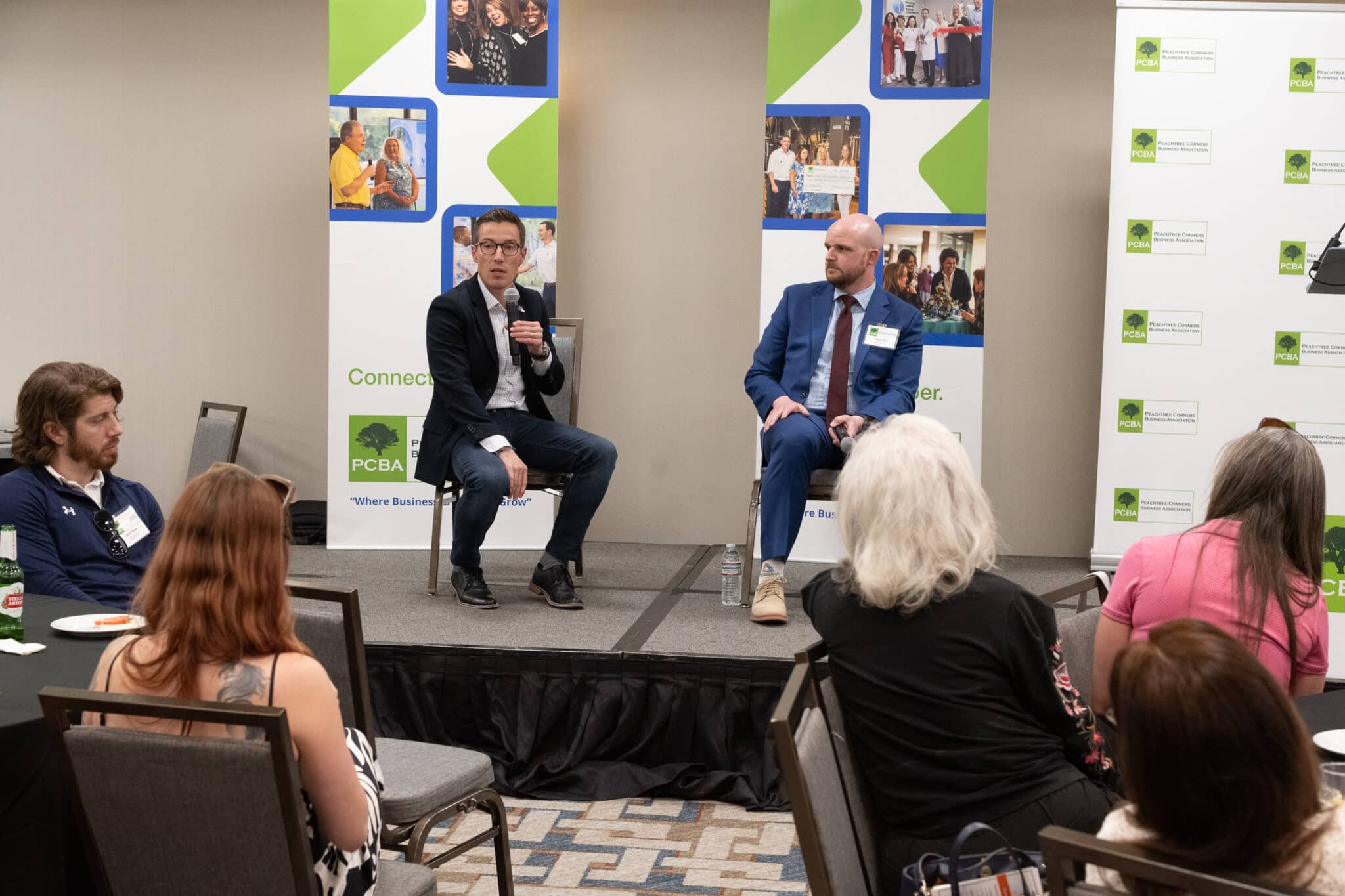
Most residents and business owners in Peachtree Corners probably think they know all about the economic development and strategic planning of Peachtree Corners, but do they really?
Peachtree Corners Business Association invited Peachtree Corners Economic Development Director Betrand Lapoire and Partnership Gwinnett Director of Economic Development Andrew Hickey to its After Hours Speaker Series on March 27 to discuss the city’s growth from a 1971 master plan to a bustling city with 42,000 inhabitants and 40,000 jobs.
Key points included the importance of business retention and expansion, with 24 projects last year creating 1,600 retained jobs, 1,600 new jobs and $250 million in new capital investment.
The Curiosity Lab, a world-class innovation center, was emphasized as a significant attraction. The city’s zoning and infrastructure plans were also discussed, focusing on balancing office and residential development to maintain a vibrant, sustainable community.
Matching jobs to residents
Although Peachtree Corners is just a teenager in terms of being an incorporated city, the foundation for this vibrant, fast-paced economic hub was laid more than 50 years ago by technology pioneer Paul Duke.
“Peachtree Corners was the first master-planned, business innovation technology park in metro Atlanta,” said Lapoire. “It was in response to the brain drain of technology with Georgia Tech graduates leaving the area.”
While the city may have a small-town feel, it’s the largest in Gwinnett County by population, but not land mass, he added.
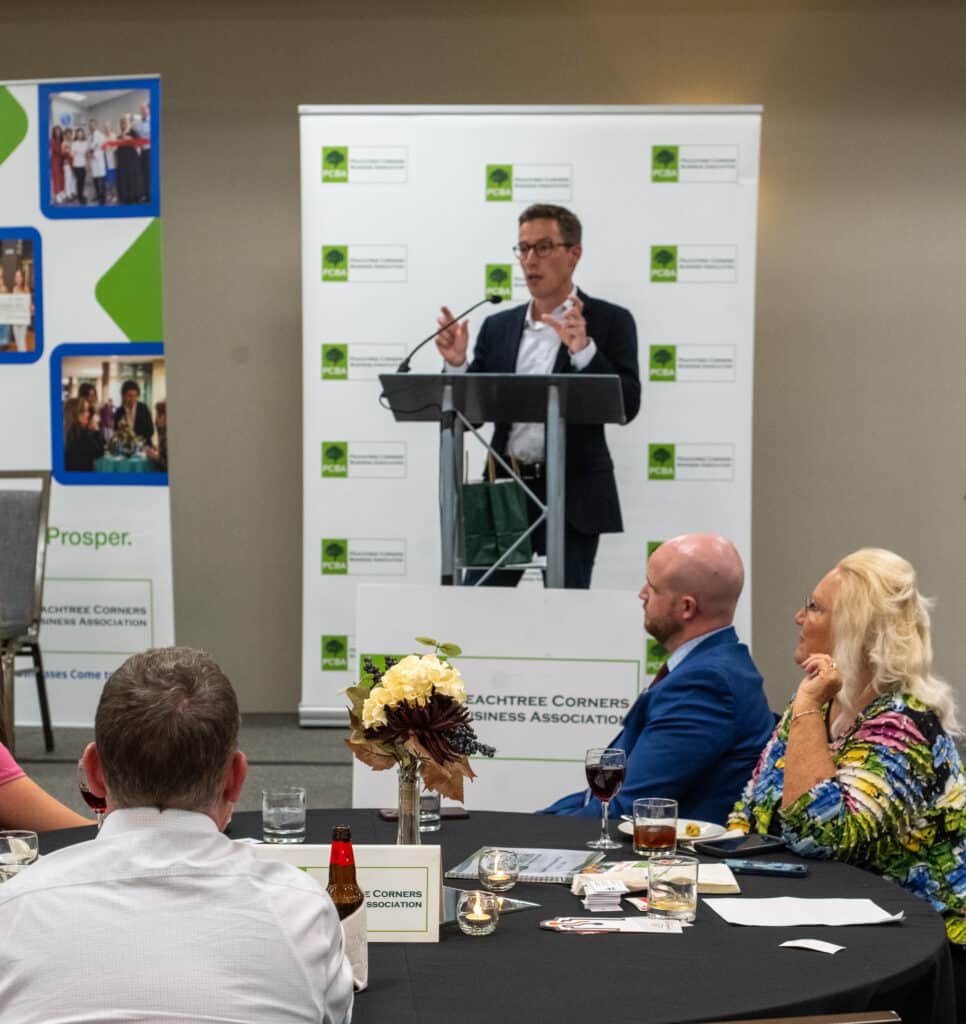
“The city started from a commercial, industrial, R&D base and then was expanded around it,” said Lapoire.
Though home to more than 42,000 residents, most of the jobs in Peachtree Corners are filled by people who live outside the city, he added.
“So we have this interesting mismatch, in a way, although not unusual,” said LaPoire. That creates traffic and transit issues. So that means that one of the solutions is to create more jobs here to fit the profile of the community.”
He presented charts that show professional services, consulting and engineering as the largest job categories. The next tier of businesses are wholesale and manufacturing.
“So we have a good mix of industry,” he said.
A five-year plan
The city has a five-year economic development plan (2023-2028) that outlines strategies for attracting and retaining businesses, with education and workforce development being key components.
Partnership Gwinnett has similar goals as Peachtree Corners, but on a larger scale.
“We are the county’s sales and marketing arm for all 17 cities now, and we receive funding from both municipal sources as well as existing businesses here — both in Gwinnett and outside of Gwinnett as well,” said Hickey.
He shared how Partnership Gwinnett is designed to drive a lot of major corporations toward doing business inside and with Gwinnett County.
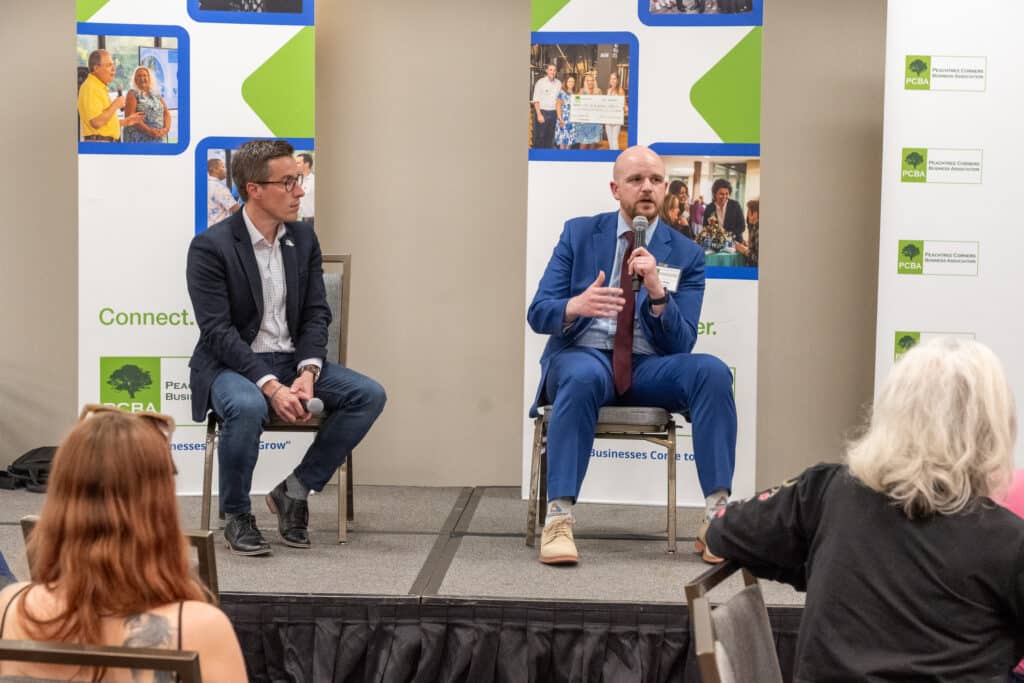
“One of the biggest things that we talk about that I’m sure it seems like most of us here, if you live here, you work here, you understand it. It’s the diversity that exists here in Gwinnett,” he said. “With a diversity index of 85, that means if we walk out of the Hilton here and we say hello to somebody, there’s an 85% chance they’re from a different ethnic or cultural background than ourselves, which to you and I may seem normal because that’s the life that we live in.”
He added that for companies, there’s a tremendous value in that, whether they have stated values, or they’re just making hiring decisions to get a wide range of candidates to fill those roles. Additionally, because of the proximity to Atlanta, Gwinnett County has a great labor draw.
Partnership Gwinnett
Partnership Gwinnett plays a significant role in recruiting businesses, expanding existing companies and developing the workforce. Hickey showed how the organization was involved with more than 24 projects last year.
“A majority of those were expansions, and that is a common thread you’ll see in economic development,” he said. “In business retention, expansion is so vital to working with our existing companies to make sure that they have the resources they need.”
He added that’s what leads to new investment and job creation in the community.
The organization also focuses on redevelopment projects, working with cities and the county to improve infrastructure and community amenities — especially strong educational institutions such Georgia Gwinnett College, Philadelphia College of Osteopathic Medicine and others.
Quality of life
In closing, both men stressed the importance of recruiting companies and developing the workforce, along with one aspect that means a lot but may not be as obvious — quality of life.
“It’s definitely evident that people like to work where they live — the whole live, work play experience,” said Hickey. “I joke that the part that people really have the most questions about, and are most excited to learn about, is new events at The Forum or Gwinnett Place Mall.”
Although they want to know what’s the next major company coming to Gwinnett, people REALLY want to know about how to spend their leisure time.
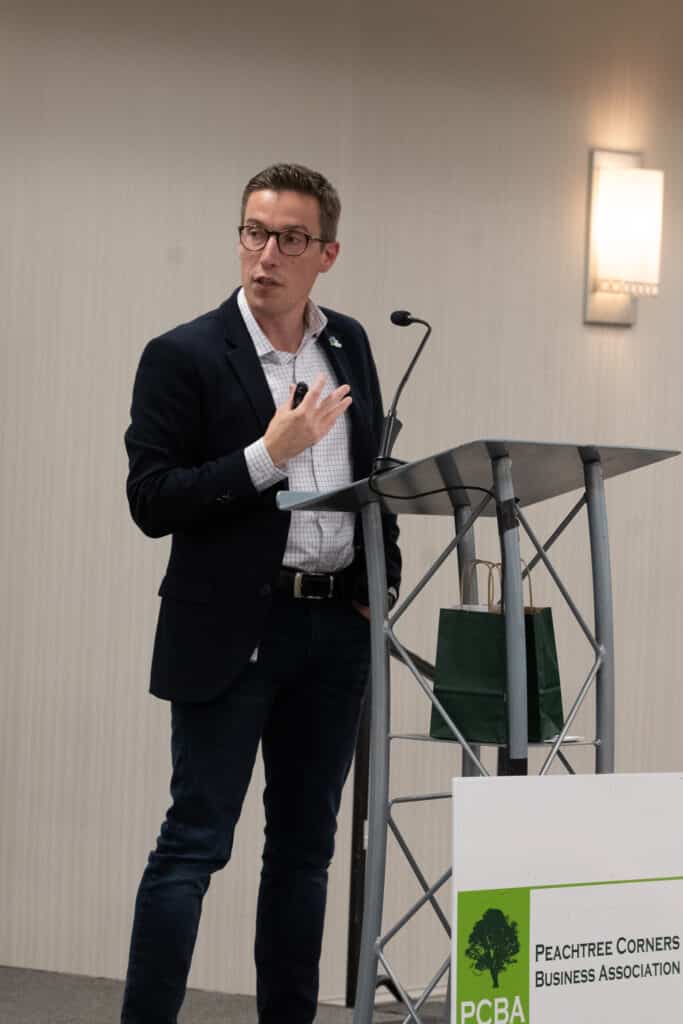
“That speaks to the importance of ensuring that we have a great community,” he said. “So at Partnership Gwinnett we work with all of our cities, and the county government as well, [on] a kind of a best-practices trip.”
He added that the peer tour allows everyone to know what the neighboring communities are doing and share the good news.
“We will take all of these elected officials, but also city staff, to different cities across the Southeast,” he said. “Last year, I believe they went to Huntsville, and have been to Greenville, Chattanooga — all cities that have done some really cool redevelopments that have taken their city to the next level. Our goal is to learn from them.”
Related
Read the Digital Edition
Subscribe
Keep Up With Peachtree Corners News
Join our mailing list to receive the latest news and updates from our team.
You have Successfully Subscribed!

Peachtree Corners Hosts Discussion About the Future of Local Policing

MomoCon 2025 to bring 60,000 Fans to Atlanta for a Weekend of Cosplay, Animation, Gaming and Music

D1 Training Brings New Fitness Concept to Peachtree Corners

Atlanta’s Dog Howl-O-Ween Festival Moving to Peachtree Corners for 2025

From Boardrooms to the Himalayas: Vandana’s Journey to Purpose and Growing with Intention [Podcast]

Local Special Olympics Pickleball Team Honored with State House Resolution

Brandon Branham Honored for Transformative Leadership in Peachtree Corners

Music Matters Productions Expands Peachtree Corners Headquarters

Celebration and Community: ICAGeorgia Wraps Up School Year with Two Festive Events

Guardians of the Jukebox to Play the VoxStage on May 31

Music Matters Productions Expands Peachtree Corners Headquarters

Brandon Branham Honored for Transformative Leadership in Peachtree Corners

From Boardrooms to the Himalayas: Vandana’s Journey to Purpose and Growing with Intention [Podcast]

MomoCon 2025 to bring 60,000 Fans to Atlanta for a Weekend of Cosplay, Animation, Gaming and Music

Local Special Olympics Pickleball Team Honored with State House Resolution

Atlanta’s Dog Howl-O-Ween Festival Moving to Peachtree Corners for 2025

Light up the Corners [Video]

Capitalist Sage: Business Leadership in Your Community [Podcast]

Cliff Bramble: A Culinary Adventure through Italy

Top 10 Brunch Places in Gwinnett County

A Hunger for Hospitality

THE CORNERS EPISODE 3 – BLAXICAN PART 1

Top 10 Indoor Things To Do This Winter

The ED Hour: What it takes to Remove Barriers from Education

Peachtree Corners Life
Topics and Categories
Trending
-
City Government4 days ago
Brandon Branham Honored for Transformative Leadership in Peachtree Corners
-
Business4 days ago
Music Matters Productions Expands Peachtree Corners Headquarters
-
Entertainment2 days ago
Guardians of the Jukebox to Play the VoxStage on May 31
-
Education2 days ago
Celebration and Community: ICAGeorgia Wraps Up School Year with Two Festive Events





